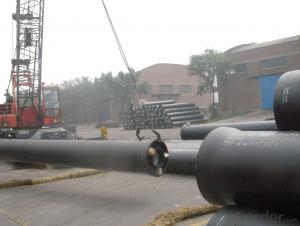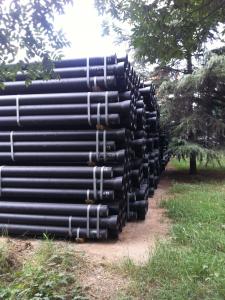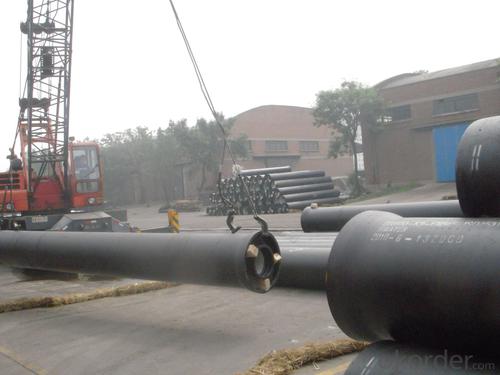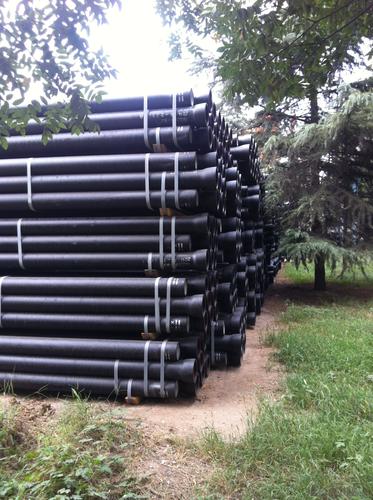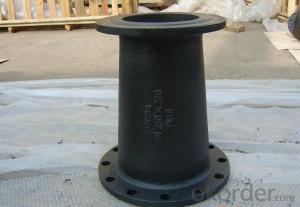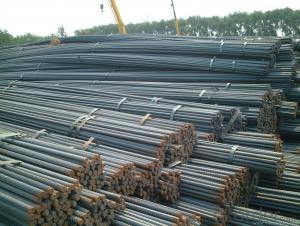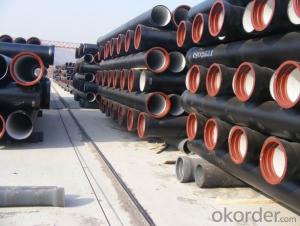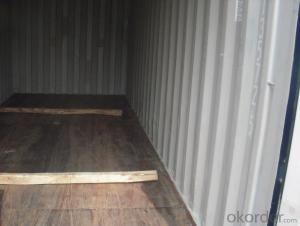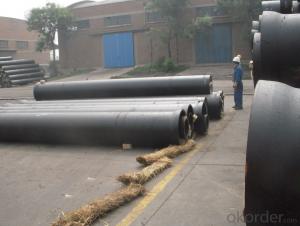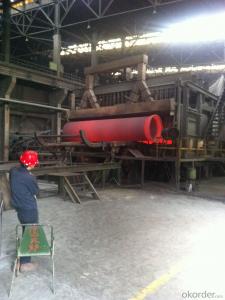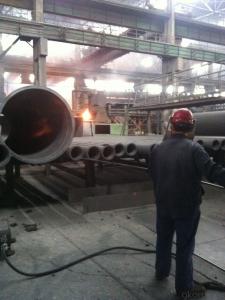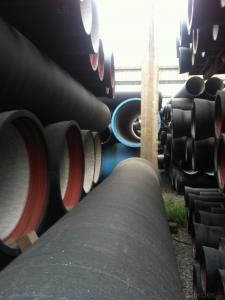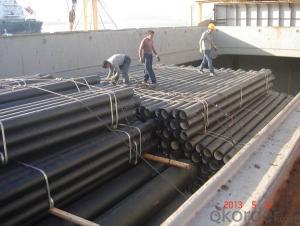DUCTILE IRON PIPE AND PIPE FITTINGS K7 CLASS DN1400
- Loading Port:
- Tianjin
- Payment Terms:
- TT OR LC
- Min Order Qty:
- 23 pc
- Supply Capability:
- 3000 pc/month
OKorder Service Pledge
OKorder Financial Service
You Might Also Like
· Material : Ductile Cast Iron
· Size Range : DN 80mm to DN 2000mm
· Unit Effective Length : 6m or 5.7m
· Manufacture Standard: ISO 2531:1998/ EN 545:2006/EN 598:2007
· Annual capacity : 200,000 tons
· Coating Exterior: Zinc 130g/m2 according to ISO 8179-1 and bitumen coating 70 microns.
· Cement Interior: Portland Cement/ High Alumina Cement/ Sulphate Resisting Cement Lining according to ISO 4179
· Special requirements on external coating and internal lining can be applied
· We also provide accessories such as SBR/EPDM rubber gaskets, lubricant paste, pipe caps, PE sleeves, etc.
Additional Parts:
Each pipe is strictly inspected according to related standard to ensure permanently high performance.
Easy Installation at site and service free for life
Long Service Lifespan
Quotation will arrive you within 24hours once we get your inquiry.
We guarantee offering you a competitive price.
A copy of original inspection reports of pipes will be offered after shipment.
Photos of loading process will be sent to the customer after shipment effect.
We will follow-up the delivery progress after shipment effect and update to the customer on weekly basis.
- Q: Ductile cast iron can replace copper sleeve
- The tensile and compressive capacity of the ball milled cast iron is not as good as that of copper. The hardness of Rongchang graphite copper sheath can reach HB210
- Q: Can ductile iron pipes be used for underground oil and gas pipelines?
- Yes, ductile iron pipes can be used for underground oil and gas pipelines. Ductile iron is a strong and durable material that can withstand high pressure and corrosive environments, making it suitable for such applications. Additionally, its flexibility allows it to accommodate ground movement and settle effectively, reducing the risk of damage to the pipelines.
- Q: How do ductile iron pipes handle extreme temperatures?
- Ductile iron pipes are highly resistant to extreme temperatures. They can handle both high and low temperatures without any significant impact on their performance. This is due to the unique properties of ductile iron, including its high thermal conductivity and low thermal expansion coefficient. These characteristics allow the pipes to remain stable and durable, making them suitable for a wide range of temperature conditions.
- Q: Method for joining cast iron pipes
- The connection between the pipe and the pipe adopts the form of socket type or flange disk interface. According to the function, it can be divided into two kinds: flexible interface and rigid interface. The flexible interface is sealed with rubber ring, which allows a certain degree of corner and displacement, so it has good seismic resistance and tightness. It is easy and quick to install than rigid interface. It has little labor intensity according to the casting method.
- Q: How does ductile iron pipe perform in areas with high soil stability?
- Ductile iron pipe performs exceptionally well in areas with high soil stability. Its robust and durable nature allows it to withstand the pressures exerted by the stable soil, ensuring a reliable and long-lasting performance. Additionally, the flexibility of ductile iron allows it to accommodate ground movements and settlement without compromising its integrity. Overall, ductile iron pipe is a suitable choice for areas with high soil stability, providing efficient and dependable water distribution and sewerage systems.
- Q: Can ductile iron pipes be used for underground sewage systems?
- Underground sewage systems can utilize ductile iron pipes, which offer numerous advantages. Ductile iron is a form of cast iron that possesses improved flexibility and strength, making it suitable for a variety of applications, including sewage systems. The first advantage of ductile iron pipes for underground sewage systems is their exceptional resistance to corrosion. This is particularly important in sewage systems where moisture and chemicals can contribute to corrosion over time. By resisting corrosion, these pipes ensure long-term durability and reliability. Additionally, ductile iron pipes possess high tensile strength, enabling them to withstand the pressure and stress that occur in underground sewage systems. They are also capable of withstanding ground movements, such as soil settling or shifting, which can cause damage to pipes made from other materials. Moreover, ductile iron pipes have a smooth internal surface, resulting in improved flow capacity and reducing the likelihood of clogging or blockages in the sewage system. This smooth surface also minimizes the accumulation of debris and sediment, lessening the need for frequent maintenance and cleaning. Another significant aspect is that ductile iron pipes are available in various sizes and can be easily connected using a range of joint systems. This allows for flexibility when designing and constructing underground sewage systems. In conclusion, ductile iron pipes are an excellent choice for underground sewage systems due to their corrosion resistance, high tensile strength, smooth internal surface, and ease of installation.
- Q: Can ductile iron pipes be used for fire protection systems?
- Yes, ductile iron pipes can be used for fire protection systems. Ductile iron is a type of cast iron that exhibits high strength and flexibility, making it suitable for a wide range of applications, including fire protection systems. It has excellent mechanical properties, including high tensile strength and impact resistance, which are important factors for withstanding the high pressures and stresses that can occur during fire suppression efforts. Ductile iron pipes are known for their durability and longevity, which is crucial for fire protection systems that need to be reliable and functional for extended periods of time. They have a longer lifespan compared to other materials, such as PVC or galvanized steel, and are less prone to corrosion, which is especially important for fire protection systems as they need to remain operational even after long periods of inactivity. Furthermore, ductile iron pipes have excellent fire resistance properties. They can withstand high temperatures without losing their structural integrity, ensuring that the fire protection system remains intact and functional during a fire emergency. This is crucial for ensuring the safety of occupants and minimizing property damage. In addition to their mechanical and fire-resistant properties, ductile iron pipes are also compatible with various types of fittings, valves, and accessories commonly used in fire protection systems. This allows for easy installation and integration into existing fire suppression networks. Overall, ductile iron pipes are a reliable and suitable choice for fire protection systems due to their high strength, durability, fire resistance, and compatibility with other system components.
- Q: Are ductile iron pipes suitable for potable water systems?
- Yes, ductile iron pipes are suitable for potable water systems. Ductile iron is a strong and durable material that is resistant to corrosion, making it a reliable choice for transporting drinking water. Additionally, ductile iron pipes have been widely used in potable water systems for many years, proving their suitability and effectiveness.
- Q: Can ductile iron pipes be used for underground fire protection systems?
- Yes, ductile iron pipes can be used for underground fire protection systems. Ductile iron has excellent strength and durability, making it suitable for handling the high pressures and extreme conditions associated with fire protection systems. Additionally, it has good corrosion resistance, allowing the pipes to withstand exposure to moisture and other underground elements.
- Q: Can ductile iron pipe be used for water distribution systems in cold climates?
- Yes, ductile iron pipe can be used for water distribution systems in cold climates. Ductile iron pipe is known for its strength and durability, making it suitable for various applications, including water distribution systems. It has excellent resistance to external loads, such as freezing temperatures, frost heaving, and ground movement, which are common in cold climates. Additionally, ductile iron pipe has a high tolerance for temperature fluctuations, making it reliable for water transportation even in extreme cold conditions. Its corrosion resistance properties also ensure the longevity and reliability of the pipe, even in harsh environments. Therefore, ductile iron pipe is a suitable choice for water distribution systems in cold climates.
Send your message to us
DUCTILE IRON PIPE AND PIPE FITTINGS K7 CLASS DN1400
- Loading Port:
- Tianjin
- Payment Terms:
- TT OR LC
- Min Order Qty:
- 23 pc
- Supply Capability:
- 3000 pc/month
OKorder Service Pledge
OKorder Financial Service
Similar products
Hot products
Hot Searches
Related keywords
